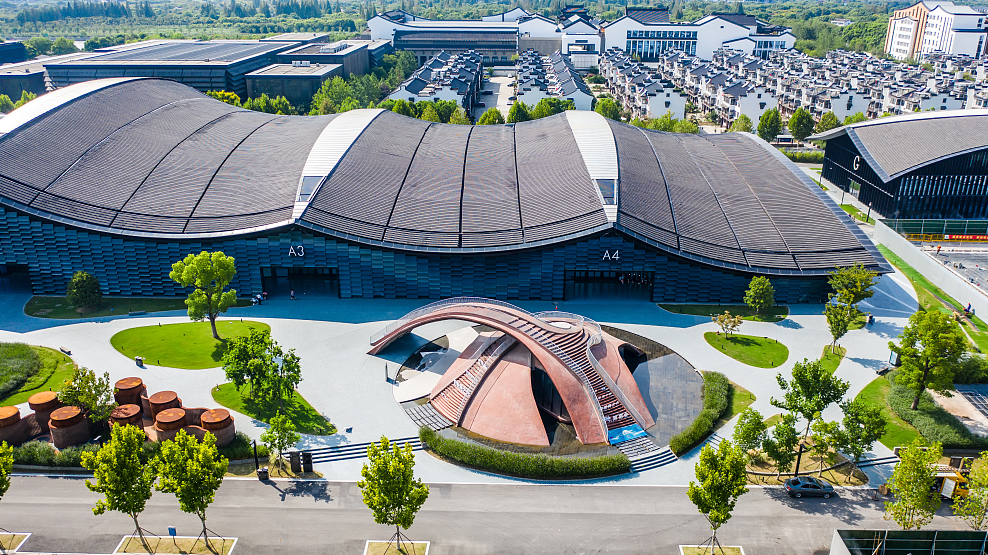
Wuzhen International Internet Exhibition & Convention Center. /CFP
Wuzhen International Internet Exhibition & Convention Center. /CFP
Editor's note: Cheng Le is a chair professor of Guanghua Law School, Zhejiang University, executive dean of International Strategy and Law, Zhejiang University, and executive director of the Institute of International Governance on Cybersecurity. The views expressed in this article are the author's personal views and do not necessarily represent those of CGTN.
The 2022 World Internet Conference (WIC) Wuzhen Summit kicked off on Nov. 9 in the river town of Wuzhen in east China's Zhejiang Province. The summit is focusing on the theme "Towards a Shared Digital Future in a Connected World -- Building a Community with a Shared Future in Cyberspace." President Xi Jinping sent a congratulatory letter to the conference, which reflects China's profound insight into the digital technology revolution and industrial transformation.
The conference also demonstrates China's sincerity in joining hands with the rest of the world to build a community with a shared future in cyberspace and highlights its willingness to strengthen dialogue and exchanges with the international community. The conference also deepens practical cooperation, and manifests China's determination to contribute its wisdom to global Internet governance and the global digital development path.
Over the past nine years, the World Internet Conference has evolved into a high-end global platform for global Internet governance and digital economy exchanges and cooperation. That's by continuing to gather the wisdom and consensus of all parties and continuing to deepen cooperation in the digital field by joining forces to build a community with a shared future in cyberspace.
The summit is prominent in the following four characteristics. First, it broadens the scope of collaboration while highlighting the traits of international organizations. This is the inaugural gathering organized by the World Internet Conference, a permanent international organization that provides an institutional mechanism for bridging the digital divide, for global governance of cyberspace, and for international cooperation and development of the Internet.
Second, the summit insists on collaborating to create a digital future. More than 2,000 representatives from over 120 countries and regions are attending the conference in person or virtually.
Thirdly, the summit focuses on global issues and provides insights into future trends. The conference has set up thematic forums to discuss common issues that affect all of humanity equally, including innovation in technology and ecology, ensuring the rule of law on the Internet, bridging the digital divide, promoting digital public welfare and reducing digital poverty, as well as global regulations in cyberspace.
Fourthly, it showcases technological achievements and stimulates innovation. The conference releases the annual cutting-edge technological achievements in the sphere of the Internet for the entire world, and stimulates the innovative vitality of businesses and entrepreneurial teams by setting up a special competition on the Internet.
With the synergy of industrial digitalization and digital industrialization, it is obvious that digital technology has become a driving force for social development, and also penetrates almost each and every aspect of our daily life as well as national security. It is therefore necessary to balance the relationship of development and security, especially sticking to the bottom lines and red lines of national securities. If we can take national security holistically, it covers a wide range of themes, such as personal privacy, geographical information, and critical information infrastructure. Around these themes, cross-border data flow is the core and usually causes conflicts of law, which entails international joint efforts. Due to different historical and social contexts, it is not unusual that there are divergences on cyber security and data security between various jurisdictions, which, however, is never a hurdle to international collaboration and cooperation in digital and cyber governance. In other words, integrity can be achieved while maintaining diversity. This conference is a key demonstration of such ideology.
Through this conference, countries and regions can strengthen communications and cooperation on the basis of mutual respect and trust. They can also promote the reform of the global Internet governance system, jointly build a peaceful, secure, open and cooperative cyberspace, and establish a multilateral, democratic and transparent global Internet governance system.
WIC, now in the form of an international organization, will provide institutional platforms for scholars and practitioners to work out feasible mechanisms for international governance in cyberspace. That well echoes the proposal of establishing an IO-based international order within the framework of the United Nations as advocated by China.